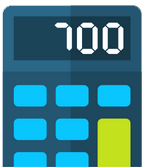What is the 2020-2021 Personal Allowance?
The government gave itself the target of having a Personal Allowance amount of £12,500 by the 2020-21 tax year. As you probably know, they reached this target last year.
So, for the 2020-21 tax year the tax free Personal Allowance amount remains at £12,500. We expect this to be confirmed in the Chancellor’s Spring Budget.
When does the new tax year start?
The new tax year does not actually start in January. Our tax years run from April to April. The 2020-21 tax year begins on 6th April 2020 and runs until 5th April 2021.
Why do I need to know what the Personal Allowance amount is?
The Personal Allowance is the amount you are allowed to earn before you have to pay any income tax. It’s important to be aware of this figure so you can work out how it impacts on your personal finances, particularly if your employment circumstances change.
The Personal Allowance amount is also part of decrypting your tax code. The number in your tax code is the Personal Allowance figure, divided by ten. Although the numerals will stay the same, you still need to check your tax code to ensure the letters correctly represent your current employment situation. This is not necessarily exactly the same as your colleagues’.
HMRC will send you a P2 Notice of Coding to tell you what your new tax code is. They are not infallible, so you need to double check that this is right. The onus is on you to make sure that you are paying the correct amount of tax. And if your tax code is wrong, you are paying the wrong amount of income tax.
Are the income tax bands changing in the 2020-21 tax year?
Again, the government reached its 2020-21 targets last tax year. So the tax bands remain the same.
- Basic Rate threshold: £37,500
- Higher rate threshold: £50,000
If you earn £125,000 or more, you will not benefit from any Personal Allowance as it is incrementally decreased the more you earn over £100,000.
These tax bands will only apply in England and Northern Ireland in 2020-21. Both the Scottish Executive and Welsh Assembly now set their own income tax brackets. They will announce these in their own budgets, after Westminster has laid out their Spring Budget.
What is the impact of these government decisions about income tax?
According to HMRC’s figures, the continuation of these applied numbers will benefit 30.7million taxpayers.
- 148,000 fewer people will be paying basic rate income tax
- 314,000 less people paying the higher rate of income tax
- 1million higher rate taxpayers will gain an average of £228
- 1million basic rate taxpayers will gain a much smaller average of £20
- Additional rate taxpayers make an average gain of £169
- 901,000 taxpayers will lose an average of £64 due to a raise in Upper Profits and Upper Earnings Limits for National Insurance
I’m not sure how any of this applies to me
It is tricky to look at HMRC decisions and extricate the bits that apply to your own situation. Because everyone’s circumstances are different, it’s impossible to give information that is immediately applicable without any further consideration.
It is relevant in one way or another for both employed people under PAYE and the self employed. If you are self employed your accountant should be able to explain how any of the changes will effect you and your business.
Your main priority is that you are meeting your tax liability in full. In other words, you are paying all the income tax you are supposed to. Pay too little and you’ll end up with a surprise bill. And no one wants to pay too much tax. It is your sole responsibility to make sure you pay enough tax, not HMRC’s.
Income Tax Calculator
Estimate how much tax you should pay on your income...






